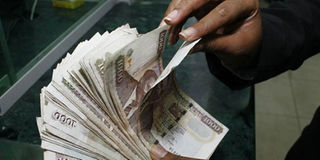Tinker not with money laundering laws

After ‘dirty’ money is ‘sanitised’ by passing it through the banking system, it is utilised for legitimate investments in the economy. PHOTO | FILE | NATION MEDIA GROUP
What you need to know:
- Anti-money laundering procedures and regulations are geared towards checking the generation of income through illegitimate activities.
- One of the surest ways of stifling terrorism is by denying terror masterminds the platform to move money freely through our financial systems.
Money laundering is the ‘cleaning’ of money obtained by illegal means through a complex web of commercial transactions.
Some of the most common illegitimate sources of income are corruption, crime, drug trafficking, extortion and gambling.
After ‘dirty’ money is ‘sanitised’ by passing it through the banking system, it is utilised for legitimate investments in the economy, concealing its origin.
The term ‘money laundering’ has its origins in the Italian Mafia and the underworld dealings of Al Capone in the US.
Capone purchased for sale cash-only laundromats (a self-service laundry with coin-operated washers) as a front to mask his illicit income from prostitution, extortion, gambling and bootlegging in the early 20th century.
Legitimate laundromat sales were mixed with the illegal incomes, making it hard for law enforcers to keep track of Capone’s criminal cash flows.
COMPLIANCE
Anti-money laundering procedures and regulations are geared towards checking the generation of income through illegitimate activities.
The AML laws and regulations gained global prominence in 1989 after the formation of the Financial Action Taskforce (FATF), an initiative of the G7 countries mandated with developing international standards for combating money laundering and terrorism financing.
The FATF monitors adherence to and progress in implementing recommendations on terrorism financing in member countries.
Non-compliance will land a country in the FATF blacklist, which attracts increased international scrutiny and heightened financial pressure.
As an FATF member and responsible actor in the global financial ecosystem, Kenya’s laws should match internationally recognised and accepted best practices on AML.
One of the stringent conditions imposed on financial institutions by the Central Bank is that commercial banks report transactions from Sh1 million.
CBK
Customers should fill out source of funds disclosure forms and provide supporting documents for such transactions.
To express their displeasure at the strict measure, a number of MPs last week accused the CBK Governor, Dr Patrick Njoroge, of operating with ‘impunity’ and threatened to terminate his term when it ends this month.
The conduct of our MPs stems from ignorance of international AML laws and policies, which they should acquaint themselves with.
Corruption and terrorism are two of the biggest problems Kenya is grappling with. Terrorists rely on a steady flow of cash to finance their nefarious activities.
TERRORISM
One of the surest ways of stifling terrorism is by denying terror masterminds the platform to move money freely through our financial systems, effectively paralysing their operations.
Rigorous application of the know your customer (KYC) procedures and strict adherence to AML policies will curb the injection of terrorism money into the economy and potentially deter terrorists from perpetrating wanton killings and destruction of property.
As corruption dominates the headlines with mind-boggling amounts, bank officials should demand full disclosure of the source of funds and flag suspicious transactions.
Strict observance of AML regulations will alienate the corrupt from our banks; they’ll have nowhere to hide their loot.
Mr Maosa works in the banking industry. [email protected]





